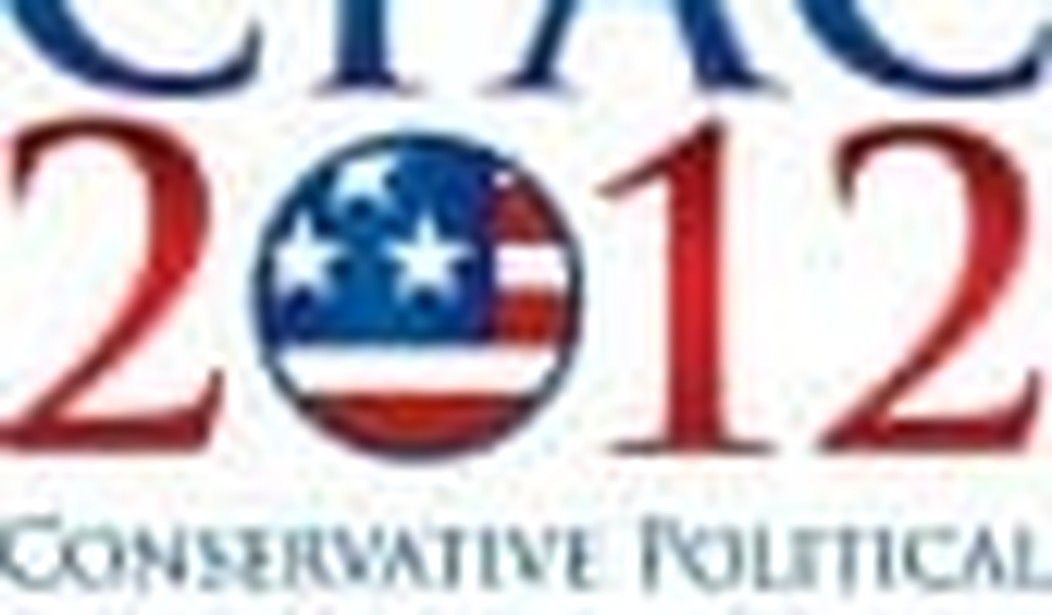If I had to sum up the three days of the Conservative Political Action Conference in as many words, it would have to be “Breitbart versus Occupiers.”
Because if reaching for more serious summaries about cohesive message, party unity, or a strongly emerging candidate, the words that hung in the air over the DC event were a solid, pervasive “what now?”
There were campaign signs and stickers dotting the landscape, and overflow seating to watch the speeches of the three GOP presidential candidates. Former Sen. Rick Santorum (Pa.) toted his family onstage to drive home his message that he’s the family values candidate, former House Speaker Newt Gingrich got the most standing ovations with a string of Pavlovian talking points yet finished third in the straw poll, and former Massachusetts Gov. Mitt Romney dropped “conservative” or some variant of the word 24 times in his address — including the “severely conservative” label that left more than a few scratching their heads.
There was the second-highest number of voters in the history of the straw poll, with nearly half of those voters being students and an almost disquieting lack of Ron Paul faithful. But those committed to other candidates weren’t exactly closing the enthusiasm gap left by Paul’s no-show, and even more attendees were overheard grousing about having to pick which candidate he or she disliked the least.
There were two hearty doses of crowd-pleasing populism in the electric speeches of former Alaska Gov. Sarah Palin and Texas Gov. Rick Perry.
Those, and addresses by other conservative favorites such as Sen. Marco Rubio (R-Fla.) and Rep. Paul Ryan (R-Wisc.), both excited attendees and reminded them that no candidate who can truly stoke the base and drive the right to the polls is actually running in this year’s presidential race.
And if such a candidate to rally the right jumped into the race, perhaps in the possibility of a brokered convention, there are no guarantees that a dream CPAC candidate could win a general election.
Yet one of the messages sent strongly by CPAC voters — and the corresponding Washington Times phone poll of 600 self-identified conservatives — is that the general election isn’t their point.
At the conference, 59 percent of straw poll voters picked a candidate’s stances on the issues as the most important quality in choosing a nominee, compared to 56 percent in the nationwide poll. Thirty-eight percent at CPAC and 33 percent nationwide picked the candidate’s chances to beat President Obama in November as most important.
Last month, Gallup reported that 40 percent of Americans identify as conservative, 35 percent as moderate, and 21 percent as liberal; independents, who comprise the largest political group in the country, lean more conservative than liberal but mostly hang out in the middle. While banking on a small-government message to reach out to that necessary independent block, there was also conference debate about whether fiscal conservatism can or should be divorced from social conservatism. And as Romney showed by leading his speech with gay marriage, and the conference topic du jour was the Obama administration’s contraception sans co-payment mandate, there seemed to be little appetite for reaching out to moderates on a social-issues level.
Another theme that gets demoted in a presidential election year is how Congress will go, and CPAC was no different. The Tea Party played a key role in shaping the current makeup of the Republican House majority, and CPAC straw poll voters gave Congress a sky-high, sunny 70 percent approval rating. This was 48 percent in the nationwide poll. Across the voter spectrum nationwide, however, the congressional job approval average is a dismal 81.7 percent disapproval rating, with a record-low 10 percent of Americans approving of the job Congress is doing in a Gallup poll last week. Scott Rasmussen reported Sunday that more voters than ever see the Republican agenda in Congress as “extreme” — 52 percent.
In short, the right has turf to defend in November as well as new ground to overtake.
The politician most mentioned, most quoted in this meeting of conservative minds was, predictably, Ronald Reagan. But there was a noticeable lack of attention paid to what was a cornerstone of the Reagan presidency in terms of a focus on foreign policy, national security, looming global threats, and a strong military that now faces a budgetary ax to take readiness down to dangerous, one-conflict levels.
When asked about personal core beliefs, both CPAC and nationwide conservative voters identified individual freedom and small government as the key issue, followed by promoting traditional values. Twelve percent of CPAC voters and 13 percent in the nationwide poll picked guaranteeing American safety at home and abroad as the driving issue, though the gauge was most definitely thrown off by what the Washington Times tacked onto the end of that question: “regardless of the cost or the size of government.”
In general, though, this reflects nationwide trends where, when asked to rank important issues, voters push terrorism, national security, and wars to the low single digits, or relegate foreign policy to the “other” bin altogether.
While some of the main speakers threw in a line or two about a nuclear Iran being unacceptable, foreign policy issues clearly ranked lower on the totem pole than others at CPAC.
These crucial issues will get a much-needed spotlight in three weeks, when Israeli Prime Minister Benjamin Netanyahu comes to town for the AIPAC conference to dish what will assuredly be a hearty helping of reality for Washington — and America.









Join the conversation as a VIP Member